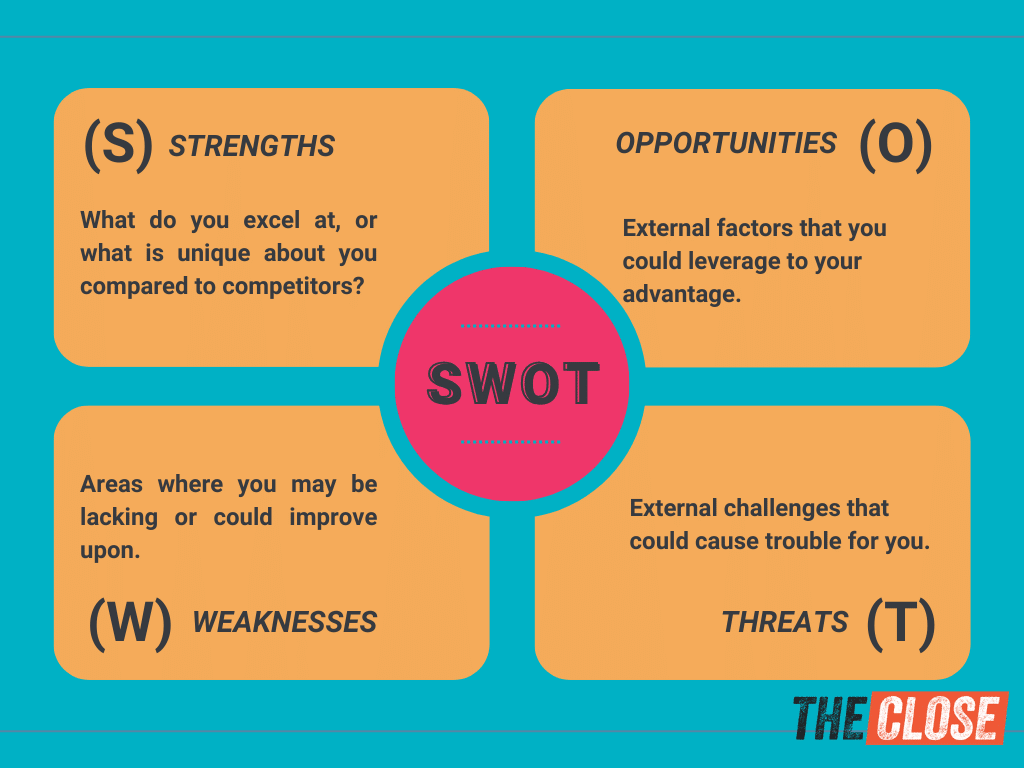Your real estate business plan is more than a to-do list; it’s your playbook for dialing in the right marketing tactics and smashing your revenue targets. Agents who invest in strategic planning consistently close more deals and build a lasting reputation. In this guide, I’ll teach you how to craft a business plan.
Before we dive in, download our free real estate business plan template to follow along.

Key takeaways:
- A well-crafted business plan serves as your roadmap to success. It guides your decisions and keeps you focused on your goals.
- Create a solid plan by defining your mission, vision, and values, analyzing your market and ideal client, conducting a SWOT analysis, setting SMART goals, and creating a financial plan.
- Regularly track your progress, review key performance indicators (KPIs), remain flexible, and hold yourself accountable to ensure long-term success.
- Remember, your realtor business plan should evolve as your business grows. Embrace change and stay focused on your goals to realize your real estate dreams.
Step 1: Identify who you are as a real estate agent
Let’s start with your “why.” Understanding the purpose behind choosing real estate is crucial, as it forms the foundation for your business plan and guides your decision-making process. Defining your mission, vision, and values will help you stay focused and motivated as you navigate your real estate career.
Mission: Your mission statement defines your purpose for pursuing a career in real estate. It clearly states what you’re trying to do, the problem you want to solve, and the difference you want to make.
📝Example:
Wanda Sellfast’s mission is to empower first-time homebuyers in Sunnyvale, California, to achieve their dream of homeownership and build long-term wealth through real estate.
Vision: Your vision statement focuses on the outcome you want for your clients and community.
📝Example:
Wanda Sellfast’s vision is a Sunnyvale where everyone can own a home and build a stable, secure future, creating a more inclusive and prosperous community for all.
Values: Your core values are the guiding principles that shape your behavior, decisions, and interactions with clients and colleagues.
📝Example:
Wanda Sellfast’s core values include:
- Community: Building strong, vibrant communities and giving back.
- Integrity: Being honest, transparent, and ethical in all dealings.
- Dedication: Being devoted to clients’ success and going the extra mile.
Clearly defining your mission, vision, and values lays the foundation for a strong and purposeful real estate business that enables you to positively impact your clients’ lives and your community.
Step 2: Analyze your real estate market
As a real estate professional, you must deeply understand your local market. This knowledge encompasses key metrics, including average days on market, average price points, common home styles and sizes, and demographic trends. When someone asks about the market, you should be able to recite those numbers confidently without hesitation.
To quickly become the local expert, choosing specific farm areas to focus on is crucial. Concentrate your marketing efforts and build your local knowledge in a handful of communities and neighborhoods. Some places to do research include:
- Your local MLS: Check your hot sheet daily.
- Zillow: Scan through the Premier Agents who show up in your neighborhood.
- Social media: Review who targets their posts in your area.
- Direct mail: Check your mailbox for flyers and postcards.
- Drive by: Drive through your farm areas to see who has signs in their yards.

Once you’ve identified your target areas, start conducting comparative market analyses (CMAs) to familiarize yourself with the properties and trends in those neighborhoods. That way, you’ll provide accurate insights to your clients and make informed decisions in your business.
Remember to research your competition. Understand what other agents working in the same area are doing and who they’re targeting, and identify any gaps in their services. This understanding will help you differentiate yourself from your competition and better serve your clients’ needs. In our real estate business planning template, I ask you to examine and record:
- Trends: Track key metrics, such as days on market and average sold prices, to stay informed about your specific market.
- Market opportunities: Identify situations where there are more buyers and sellers (or vice versa) in the marketplace so you can better advise your clients and find opportunities for them and your business.
- Market saturation: Identify areas where there may be an oversupply of specific property types or price points, enabling you to adjust your strategy accordingly.
- Local competition: Analyze your competitors’ strengths, weaknesses, and gaps in their services to identify opportunities for differentiation and possibilities to create a more meaningful impact.
Remember, real estate is hyper-local. While national and state news can provide some context, your primary focus should be on specific needs and trends within your target areas and the clients you want to serve. By thoroughly analyzing your local real estate market, you’ll be well-equipped to make informed decisions, provide valuable insights to your clients, and ultimately build a thriving business.
Step 3: Identify your ideal clients
When creating your real estate business plan, it’s crucial to identify your ideal client. You can’t be everything to everyone, no matter how much you think you should. And trust me, you certainly don’t want to work with every single person who needs real estate advice.
By focusing on your ideal client, you’ll create a targeted marketing message that effectively attracts the right people to your business — those you want to work with.

Think of your target market as a broad group of people who might be interested in your services, while your ideal client is a specific person you are best suited to work with within that group. To create a detailed profile of your ideal client, ask yourself questions like:
- What age range do they fall into?
- What’s their family situation?
- What’s their income level and profession?
- What are their hobbies and interests?
- What motivates them to buy or sell a home?
- What are their biggest fears or concerns about the real estate process?
Answering these questions will help you create a clear picture of your ideal client, making it easier to tailor your marketing messages and services to meet their needs. Consider using this ideal client worksheet, which guides you through creating a detailed client avatar. This will ensure you don’t miss any critical aspects of their profile, and you can refer back to it as you develop your marketing plan.
By incorporating your ideal client into your overall business plan, you’ll be better equipped to make informed decisions about your marketing efforts, service offerings, and growth strategies. This clarity will help you build stronger relationships with your clients, stand out from the competition, and ultimately achieve your real estate business goals.
Step 4: Conduct a SWOT analysis
If you want to crush it in this business, you’ve got to think like an entrepreneur. One of the best tools in your arsenal is a SWOT analysis. It sounds ominous, but don’t worry — it’s pretty simple. SWOT stands for Strengths, Weaknesses, Opportunities, and Threats. It’s all about taking a good, hard look at yourself and your business.

By conducting a SWOT analysis as part of your real estate business plan, you’ll have a clear picture of your current situation and future goals. And don’t just do it once and forget about it — review and update it regularly to stay on top of your game.
| Strengths | Opportunities |
| What do you excel at? Maybe you're a master negotiator or know how to find hidden gem properties. Whatever it is, own it and make it the backbone of your strategy. | What's happening in your market that you can use to your advantage? Is there an untapped niche or a new technology that could help you streamline your business? |
| Weaknesses | Threats |
| We all have weaknesses, so don't be afraid to admit yours. You may not be the best at staying organized or are struggling with marketing. The key is to be honest with yourself and either work on improving those areas or hire someone to help you. | There's competition out there, but don't let that keep you up at night. Instead of obsessing over what other agents are doing, focus on your game plan and stick to it. Identifying threats means recognizing things outside your control that could hinder your success, such as a slowing real estate market or limited inventory. |
Step 5: Establish your SMART goals and sustainability targets
In real estate, you can’t just set vague targets. You need SMART goals (Specific, Measurable, Achievable, Relevant, and Time-bound) that act as the building blocks of your realtor business plan. Your SMART real estate goals should drive everything from growing your client base to reducing your carbon footprint.
The table below shows how to establish strong SMART goals, along with examples that cover both revenue targets and sustainability efforts:
| Specific | Focus on a particular niche, outcome, or behavior. | 🎯 10 closings by September 30, 2025 🌿 Cut office electricity use by 5% in Q3. |
| Measurable | Attach metrics or benchmarks that you can track weekly or monthly. | 🎯10 closings by September 30, 2025 🌿5% year-over-year energy reduction |
| Achievable | Assess past performance and available tools. Set a challenging yet reachable bar. | 🎯Ten closed deals are doable in your real estate market. 🌿A 5% energy savings is realistic. |
| Relevant | Ensure that your goal aligns with your core business and has a long-term impact. | 🎯Drives commission revenue and grows your business 🌿Lowers overhead costs and appeals to eco-conscious clients |
| Time-bound | Set a clear deadline. | 🎯By December 31, 2025. 🌿By December 31, 2025, our office should have energy-efficient lighting, windows, and doors. |
6. Create your financial plan
Financial planning might not be your idea of a good time, but this is where your real estate business plan comes together. Most of the heavy lifting is already complete, thanks to all the research and strategizing done earlier. Now, it’s just a matter of plugging in the numbers and ensuring everything adds up.
For this part of your real estate business plan, you’ll want to account for all your operating expenses. That means everything from your marketing budget to your lead generation costs. Don’t forget about the little things (like printer ink, file folders, thank-you notes, etc.) — they might seem small, but can add up quickly.
Some typical expenses to consider include:
- Marketing and advertising (business cards, website, social media ads)
- Lead generation (online leads, referral fees, networking events)
- Office supplies and equipment (computer, printer, software subscriptions)
- Transportation (gas, car maintenance, parking)
- Professional development (training, courses, conferences)
- Dues and memberships (MLS fees, association dues)
- Insurance (errors and omissions, general liability)
- Taxes and licenses (business licenses, self-employment taxes)
Once you’ve figured out your expenses, it’s time to reverse-engineer the numbers and determine how many deals you need to close each month to cover your costs. If you’re just starting out and don’t have a track record to go off of, no worries! This planning period allows you to set a budget and create a roadmap for success.
If you’re evaluating your starting assets and realizing they don’t quite match your startup costs, don’t panic. This new insight suggests that you must revisit and refine your strategy until the numbers align with your goals. It might take some trial and error, but getting your financial plan right from the start is worth it.
Pro tip: Keep your personal and business finances separate. Never dip into your personal cash for business expenses. Not only will it make tax time a nightmare, but it’s way too easy to blow your budget without even realizing it.
Step 7: Track your progress and adjust as needed
You’ve worked hard and created a killer real estate business plan and are ready to take on the world. However, remember that your business plan isn’t a one-time deal. It’s a living, breathing document that needs to evolve as your business grows and changes. That’s why tracking your progress and making adjustments along the way is so important.
Here are a few key things to keep in mind:
-
Set regular check-ins: Schedule dedicated time to review your progress and see how you’re doing against your goals, whether weekly, monthly, or quarterly.
-
Keep an eye on your KPIs: Your key performance indicators (KPIs) are the metrics that matter most to your business. Metrics such as lead generation, conversion rates, and average sales price can clearly show your performance.
-
Celebrate your wins: When you hit a milestone or crush a goal, take a moment to celebrate. Acknowledging your successes will keep you motivated and energized.
-
Don’t be afraid to pivot: Change course if something isn’t working. Your real estate business plan should be flexible enough to accommodate new opportunities and shifting market conditions.
-
Stay accountable: Find an accountability partner, join a mastermind group, or work with a coach to help you stay on track and overcome obstacles.
Remember, your real estate business plan is your roadmap to success. But even the best-laid plans need to be adjusted from time to time. By tracking your progress, staying flexible, and keeping your eye on the prize, you’ll be well on your way to building the real estate business of your dreams.
Why agents need a real estate business plan
Your real estate agent business plan is your roadmap to success. Think of it as your GPS: it maps out where you are today, where you want to go, and the steps to get there. When the market shifts or challenges arise, your business plan is the guiding star that keeps you focused.
A well-crafted business plan helps you:
- Understand your current position in the market
- Set clear and achievable goals
- Create a roadmap for success
- Track your progress and performance
- Make informed decisions and adjustments
Pro tip: Invest the time to create a solid real estate business plan to stay on track, hit your goals, and thank yourself later for avoiding aimless detours in your career. Without it, you risk losing direction and focus in your career.
FAQs
How much would it cost to start a real estate business?
Starting as a solo agent typically costs between $1,000 and $5,000 for licensing, dues, insurance, MLS access, and marketing. If you plan on scaling your business or opening an office, add another $5,000 to $10,000. Your total cost depends on your market and the size of your business.
How do I start a small real estate business?
After getting your real estate license, find and join a brokerage that suits your niche. Then, set up your business, create a business plan, and market yourself. For more information, read our guide on starting a real estate business.
Which real estate business is most profitable?
Commercial real estate, property management, and investing are often the most profitable. Each has its perks — large commissions, steady income, or long-term gains — so it really depends on your skills, market, and risk tolerance.
Your take
Now you’ve got the steps — no more guesswork. A solid real estate business plan isn’t extra work; it’s your edge. Take the time to map it out and make it happen. Have you created your real estate business plan? Share your experience in the comments!







![7 Steps to Writing a Real Estate Business Plan [+Template]](https://assets.theclose.com/uploads/2025/05/tc-05062025-real-estate-business-plan.jpg)


